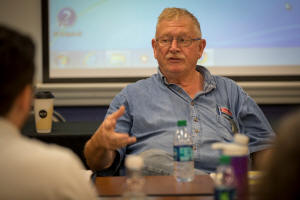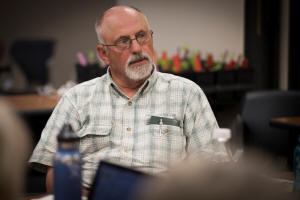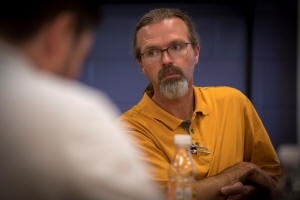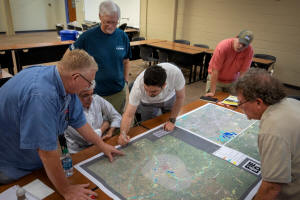|

On Monday, a training session was held for students
in the Conservation Biology Major who will be surveying the area to
assess and document current pollinator habitat. The students, Kelli
Allison, Alex Anderson and Dalton Presswood, all of Lincoln, will
also be conducting focus groups and meeting with local stakeholders
to identify opportunities to create more habitats for pollinators in
general with an emphasis on Monarchs.
“This is a great opportunity for our students to work with
professionals from one of the nation’s premier institutions,
conducting field research and developing practical solutions to a
serious environmental concern,” said Dr. Julia Ossler, Lead Faculty
for Lincoln College’s Conservation Biology Program.

On Tuesday, the Field Museum team kicked off the day with a brief
signing ceremony with Ossler, Lincoln College President David
Gerlach and Dr. Abigail Derby Lewis, director of the monarch project
for the Field Museum’s Keller Science Action Center. The Science
Action Center works to translate museum science into lasting results
for conservation and cultural understanding.




The signing ceremony was followed by a workshop and
listening session with city planners, business owners, elected
officials, engineers and other interested persons from across Logan
County to better understand the landscape in Logan County, identify
potential sites of existing monarch habitat and offer practical
training in ecological data collection.
[to top of second column] |

Every fall millions of monarch butterflies migrate
over 3,000 miles to Mexico for a safe place to spend the coming
winter months. Following winter, they migrate back part way, to
areas like Texas, where they mate and lay their eggs on milkweed
plants. After a few days, caterpillars hatch and consume the
milkweed as a food source to help them complete their life cycle by
creating a chrysalis and transforming into their iconic butterfly
form. The new butterflies fly another few hundred miles north before
finding another patch of milkweed and repeating the process. It can
take the butterflies upwards of five generations to complete the
journey to Illinois.
Monarch butterflies play a crucial role in the ecosystem as
pollinators for countless vital plants. As the adults seek out
nutrient rich nectar from the milkweed flowers, and inadvertently
transfer pollen from one plant to another and assist in those
species’ reproduction.
Globally, 87 of the leading 115 food crops evaluated are dependent
on animal pollinators such as monarch butterflies, contributing 35%
of global food production. A decline in their population could have
negative ramifications on farmers. Even in their own ecosystem,
monarch butterflies are an important food source for serval common
birds such as orioles and grosbeaks.
According to information from the Field Museum, monarch populations
have declined by 80 percent over the past two decades, stemming in
part from the loss of milkweed that serves as their food source for
both the juvenile and adult life stage.

Ossler explained that while the monarch butterfly and
other important pollinators are in decline, there are ways that
people in rural areas, cities, towns and suburbs can help. The
project will refine mapping tools and strategies for creating
monarch habitat in different contexts along the monarch’s migration
path in Logan County.

Those monarch habitats, Ossler added, can have benefits far beyond a
single species, as bees and other natural pollinators have also seen
declines in recent years and a shortage of pollinators impacts the
entire ecosystem, including agriculture.
[Mark Gordon
Public Relations and Media Manager
Lincoln College]
|